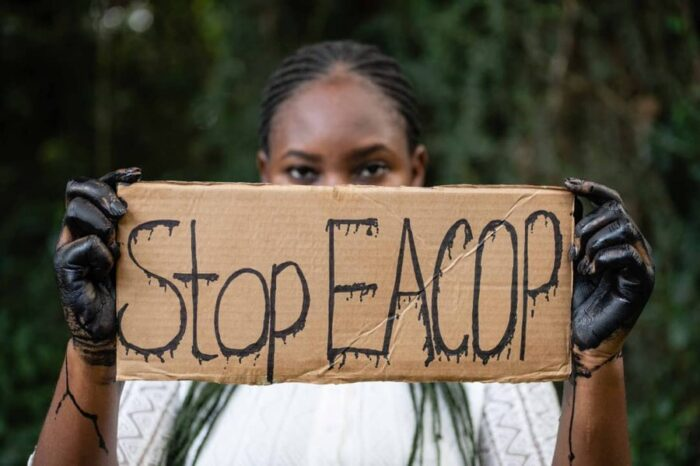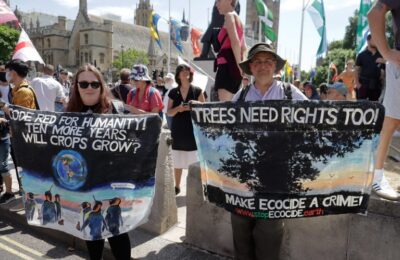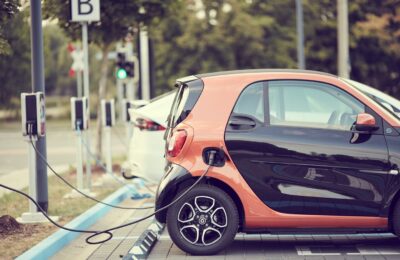From Stop Cambo website, we are a few days late in re-posting this but it still contains very useful info.
Written by Jessica Kleczka
Despite having contributed the least to the climate crisis, Africa is the continent most vulnerable to climate breakdown. Seven out of the ten countries most vulnerable to climate change are located in Africa, and its impacts threaten the livelihoods of over 100 million people already living in extreme poverty. In the face of colonisation and the plundering of its natural resources by the Global North, Aftrica’s emissions remain the lowest in the world. To this day, Western countries continue to exploit Africa’s people and resources through oil and gas production, but also through the mining of rare earth metals that are being used to power the shift towards low-carbon economies in the Global North. But this neocolonial approach to climate action perpetuates human rights abuses, and exacerbates economic problems.
This World Africa Day, we are amplifying five powerful campaigns across the African continent that are resisting extractivist industries and fighting for the rights of local and Indigenous communities. Climate justice cannot be achieved without international solidarity, and the fight against oil and gas extraction is a global one. We say: “not here, not anywhere”.
Stop EACOP (Uganda & Tanzania)

French oil giant Total and the Chinese National Offshore Oil Corporation (CNOOC) are planning to build the longest heated oil pipeline in the world through Uganda and Tanzania. The East African Crude Oil Pipeline (EACOP) would span 1,445 kilometres (900 miles) and produce more than the current combined emissions of both countries. It would pass through multiple diverse habitats that are home to endangered species – including Lake Victoria, Africa’s largest lake upon which 40 million people depend for drinking water, fishing and tourism.
Another major concern is that EACOP would lead to the displacement of tens of thousands of people. In Uganda, 7,000 locals from 13 villages have already lost land to make way for infrastructure. They are being relocated to so-called “resettlement villages”, where they live in cramped conditions.
The #StopEACOP campaign gained international attention at COP26, and is currently putting pressure on banks and insurers to drop the project. World leaders are also facing mounting pressure to oppose the highly destructive project, and activists around the world are taking the fight against EACOP to the courts and the streets.
- Read our previous article on EACOP to learn more
- Follow the #StopEACOP campaign on Instagram, Twitter and Facebook
- Donate to the campaign’s “Act local” fund to support frontline communities fighting the pipeline
- Send a message to banks urging them to not back the project
- Take digital action to support the campaign remotely
ANEEJ (Nigeria)

Ahead of Shell’s Annual General Meeting in Lagos, the Africa Network for Environmental and Economic Justice (ANEEJ) demanded an end to oil and gas production in Nigeria and for the Church of England to stop financing the industry.
Oil and gas production in the country has a history of human rights abuses, which surfaced into international consciousness after the murder of the Ogoni Nine, whose execution Shell was directly involved in. Shell has been present in the Niger Delta since the 1930’s, contributing “little more than sorrow, tears and blood” to the area. The company’s unethical operations and the environmental pollution they have caused has resulted in poverty, conflict, loss of livelihood, and loss of life. And still, Shell enjoys impunity: its obscene profits are spent on the best lawyers, who have enabled the company to escape accountability, court orders, and governments.
ANEEJ staged a “People’s AGM” outside Shell’s HQ in Lagos this week, demanding an end to the destruction caused in the oil-rich Niger Delta region – and this is just the beginning.
Fossil Free Virunga (DRC)

Virunga National Park, located in eastern DRC (Democratic Republic of Congo), is a UNESCO World Heritage site and biodiversity hotspot. It is also the oldest national park in Africa and home to the last surviving populations of mountain gorillas. The park is managed by the Virunga Foundation, a UK company which receives millions of Euros from the EU. Controversially, this money is used to employ armed guards and produce hydroelectric power which is sold outside the park, rather than benefiting local and Indigenous communities.
The DRC is sitting on a wealth of untapped resources and the Congolese government has taken advantage of this by approving oil contracts with multinationals such as Efora and Total for exploration and seismic testing – despite this being in clear breach of nature conservation laws and international conventions. Oil companies could receive exploration permits covering 21.5% of the park, putting it at risk of deforestation. The Semliki River, upon which thousands of locals depend, could become irreversibly polluted if oil and gas exploration were to go ahead.
The Fossil Free Virunga campaign, supported by XR Université de Goma (University of Goma), are urging the Congolese government to uphold its responsibility as a signatory of the Paris Agreement. They have also been using non-violent civil disobedience tactics such as sit-ins and artistic performances to educate students and the wider public about the dangers of oil exploration in Virunga National Park. The students are advocating for tripartite management of the park, shared between local communities, the DRC government, and the Virunga Foundation – ensuring transparency over funding allocation and how carbon credits are used.
- Watch this video made by 350.org to learn more about the campaign
- Follow XR Université de Goma on Instagram, Twitter and Facebook
- Sign the 350.org petition saying no to oil exploration in Virunga
- Donate to support the campaign
Justiça Ambiental (Mozambique)

Justiça Ambiental (JA!) is the Mozambique wing of Friends of the Earth, founded in the late 1990s by a group of friends concerned about the trajectory of Mozambique’s development in the process of globalisation. Mozambique is one of the world’s poorest countries, and one of the most climate-vulnerable due to its susceptibility to multiple climate hazards such as tropical cyclones, floods and severe droughts. Justiça Ambiental translates to “environmental justice”, while “ja” means now. The group organises internationally, advocating for human rights and opposing extractivism. JA! has resisted deforestation efforts, new dam builds, oil exploration and polluting activities that jeopardise safe access to clean water.
Last year, Friends of the Earth (FoE) took the UK government to the high court over its plans to approve £850 million of financing for a liquified natural gas (LNG) project in Mozambique, which would displace a number of communities and emit more than the combined annual emissions of all 27 EU countries over its lifetime. The case was heard in December, with FoE arguing that the project was incorrectly judged to be compatible with the Paris Agreement. In court, something extraordinary happened: The two judges were unable to agree on whether the project was in breach of climate commitments or not, and gave FoE permission to take the case to the Court of Appeal, which will decide whether ministers acted unlawfully in approving the financing.
- Follow JA! On Twitter and Facebook
- Follow Justiça Ambiental’s blog
- Read Friends of the Earth’s “Gas in Mozambique” report to learn more
Sustaining the Wild Coast (South Africa)

Sustaining the Wild Coast (SWC) is a grassroots group working to protect the coastal villages of Eastern Mpondoland, South Africa, their local livelihoods and culture. The Indigenous Amadiba residents are resisting environmentally damaging developments, such as mines and highway construction, in order to safeguard their earth-honouring and sustainable way of life from capitalist and neocolonial interests.
Last year, the group took oil giant Shell to court over its plans to conduct seismic testing in vital whale breeding grounds, which would have involved blasting sound waves through the relatively untouched marine environment. SWC successfully argued that Shell had failed to meaningfully consult people who would be affected by the seismic survey, and the court temporarily blocked Shell’s activities which the company tried to justify using outdated legislation.
SWC are now urging the court to make a final call to end Shell’s seismic survey plans, and the case will be heard again on May 30.



